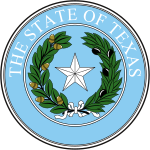
Texas' 1st congressional district in the United States House of Representatives serves the northeastern portion of the state of Texas. As of the 2000 census, the 1st district contained 651,619 people. It consists largely of three small East Texas metropolitan areas—Texarkana, Texas, Longview–Marshall, and Tyler. With a Cook Partisan Voting Index rating of R+26, it is the most Republican district in Texas. It has been represented by Republican Nathaniel Moran since 2023.

Texas's 3rd congressional district of the United States House of Representatives is in the suburban areas north and northeast of Dallas. It encompasses much of Collin County, including McKinney and Allen, as well as parts of Plano, Frisco, and Prosper. Additionally, the district includes all but the southern portion of Hunt County. The district is also home to a public four-year university, Texas A&M University-Commerce, as well as Collin College.

The 2003 Texas redistricting was a controversial intercensus state plan that defined new congressional districts. In the 2004 elections, this redistricting supported the Republicans taking a majority of Texas's federal House seats for the first time since Reconstruction. Democrats in both houses of the Texas Legislature staged walkouts, unsuccessfully trying to prevent the changes. Opponents challenged the plan in three suits, combined when the case went to the United States Supreme Court in League of United Latin American Citizens v. Perry (2006).

Texas's 22nd congressional district of the United States House of Representatives covers a largely suburban southwestern portion of the Greater Houston metropolitan area. The district includes most of Fort Bend County, including most of the cities of Sugar Land, Rosenberg, Needville and the county seat of Richmond as well as the county's share of the largely unincorporated Greater Katy area west of Houston. In addition, the district also contains portions of northern Brazoria County, including most of Pearland and Alvin and all of Wharton and Matagorda counties, as well as a small portion of western Harris County centered on most of that county's share of the Greater Katy area.

Texas's 25th congressional district of the United States House of Representatives stretches from Arlington and Fort Worth to some of its outer southwestern suburbs, as well as rural counties east of Abilene. The district's current Representative is Roger Williams.
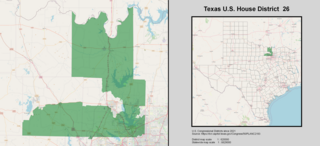
Texas' 26th congressional district of the United States House of Representatives includes rural Cooke County to the north and some of Wise County to the West and includes parts of Denton County, including Flower Mound, Lewisville and parts of Corinth, Carrollton, Little Elm and The Colony. The current Representative is Michael C. Burgess. The district is best known as the seat of former House Majority Leader Dick Armey.
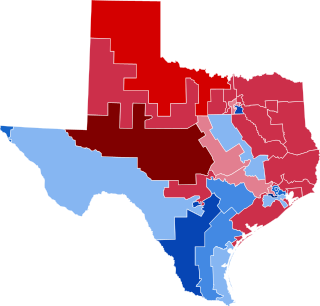
The 2006 United States House of Representatives elections in Texas were held on November 7, 2006, to determine the 32 U.S. representatives from the state of Texas, one from each of the state's 32 congressional districts. These elections coincided with the 2006 midterm elections, which included a gubernatorial election and an election to the U.S. Senate.

The 2008 elections for the Texas delegation of the United States House of Representatives was held on November 4, 2008. 31 of 32 congressional seats that make up the state's delegation were contested. In Texas's 14th congressional district no one challenged incumbent Ron Paul. Since Representatives are elected for two-year terms, those elected will serve in the 111th United States Congress from January 4, 2009, until January 3, 2011.
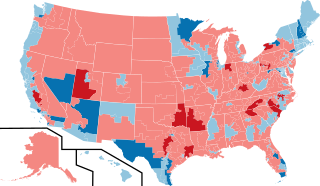
The 2012 United States House of Representatives elections were held on November 6, 2012. It coincided with the reelection of President Barack Obama. Elections were held for all 435 seats representing the 50 U.S. states and also for the delegates from the District of Columbia and five major U.S. territories. The winners of this election cycle served in the 113th United States Congress. This was the first congressional election using districts drawn up based on the 2010 United States census.
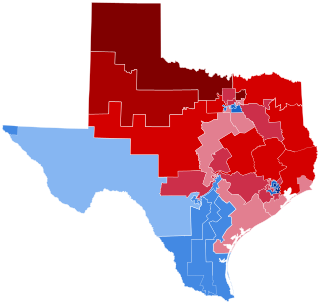
The 2012 United States House of Representatives elections in Texas were held on Tuesday, November 6, 2012, to elect the 36 U.S. representatives from the state of Texas—an increase of four seats in reapportionment following the 2010 United States census. The elections coincided with the elections of other federal and state offices, including a quadrennial presidential election and an election for the U.S. Senate. The primary election had been scheduled to be held on March 6, 2012, with a runoff election on May 22; because of problems arising from redistricting, the primary was postponed to May 29, and the run-off to July 31.

The 1992 United States House of Representatives elections in Texas occurred on November 3, 1992, to elect the members of the state of Texas's delegation to the United States House of Representatives. Texas had thirty seats in the House, apportioned according to the 1990 United States census.

The 1984 United States House of Representatives elections in Texas occurred on November 6, 1984, to elect the members of the state of Texas's delegation to the United States House of Representatives. Texas had twenty-seven seats in the House, apportioned according to the 1980 United States census.

The 2002 United States House of Representatives elections in Texas occurred on November 5, 2002, to elect the members of the state of Texas's delegation to the United States House of Representatives. Texas had thirty-two seats in the House, apportioned according to the 2000 United States census. The state gained two seats in reapportionment. Democrats narrowly maintained control of the Texas House of Representatives after the 2000 election after heavily emphasizing it as necessary to protect the party from a potential Republican gerrymander. During the 2001 regular session, the divided legislature failed to pass any redistricting plans. Congressional redistricting fell to the courts in Balderas v. State of Texas after no special session was called to address redistricting. While the court's initial map appeared to benefit Republicans, the final maps ordered for the 2002 elections were seen as beneficial to Democrats.
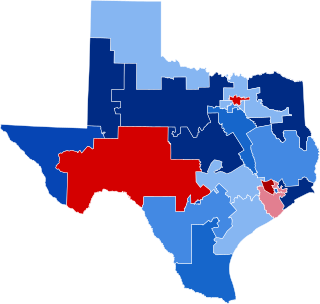
The 1980 United States House of Representatives elections in Texas occurred on November 4, 1980, to elect the members of the state of Texas's delegation to the United States House of Representatives. Texas had twenty-four seats in the House apportioned according to the 1970 United States census.

The 1996 United States House of Representatives elections in Texas occurred on November 5, 1996, to elect the members of the state of Texas's delegation to the United States House of Representatives. Texas had thirty seats in the House, apportioned according to the 1990 United States census.

The 1986 United States House of Representatives elections in Texas occurred on November 4, 1986, to elect the members of the state of Texas's delegation to the United States House of Representatives. Texas had twenty-seven seats in the House, apportioned according to the 1980 United States census.

The 1978 United States House of Representatives elections in Texas occurred on November 7, 1978, to elect the members of the state of Texas's delegation to the United States House of Representatives. Texas had twenty-four seats in the House apportioned according to the 1970 United States census.

The 1994 United States House of Representatives elections in Texas occurred on November 8, 1994, to elect the members of the state of Texas's delegation to the United States House of Representatives. Texas had thirty seats in the House, apportioned according to the 1990 United States census.

The 1974 United States House of Representatives elections in Texas occurred on November 5, 1974, to elect the members of the state of Texas's delegation to the United States House of Representatives. Texas had twenty-four seats in the House apportioned according to the 1970 United States census.
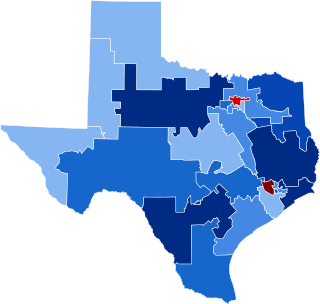
The 1976 United States House of Representatives elections in Texas occurred on November 2, 1976, to elect the members of the state of Texas's delegation to the United States House of Representatives. Texas had twenty-four seats in the House apportioned according to the 1970 United States census.

